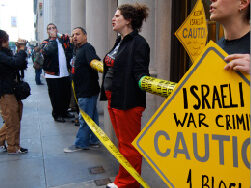One of the core areas of IJAN’s work is strategic defense against backlash. By “backlash” we mean the efforts of Zionists, and other reactionary forces with which Zionism collaborates, to repress criticisms of Israel and the organizing of the Palestinian liberation and Palestinian solidarity movements. Backlash employs a variety of tactics, from false charges of antisemitism to legal intimidation and even the threat of physical violence. By “strategic defense” we mean responding to backlash in ways that not only keep our communities and movements safe, but also advance our strategies and build the collective power of movements for justice and liberation.
Over the years, IJAN has worked in partnership with a variety of organizations trying to defend themselves, their communities, or their campaigns from backlash, including but not limited to: the Olympia Food Co-op (the first grocery store in the U.S. to publicly honor the Palestinian call for the boycott of Israeli goods), Professor Rabab Abdulhadi and the Arab and Muslim Ethnicities and Diasporas Initiative (AMED).
IJAN has recently been working with students, faculty, activists, and lawyers from around the U.S. to create a national network for strategic defense. Our hope is that this network will be able to serve as a conduit for mobilizing our organizations, communities, and movements when rapid and strategic response to backlash is needed, whether on or off campus. Our recently released report, The Business of Backlash: The Attack on Palestinian and Other Social Justice Movements, similarly aims to offer information and analysis of the interests and funding behind backlash, the tactics these forces employ, and some of the implications for movement-building.
IJAN believes that strategic defense against backlash is a critical front in the struggle against Zionism and other forms of racism and colonialism, and for collective liberation. As The Business of Backlash documents, the interests and funding behind Zionist backlash are often the very same forces that are engaged in repressing other movements for justice. Strategic defense, as a shared site of struggle, can be a means of identifying and fighting against common enemies, of building common cause with other struggles for justice and liberation, defending ourselves and one another, and building our collective power in the process.



